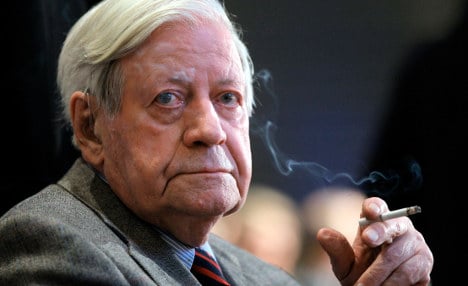Perhaps, just perhaps, it has something to do with a flagging libido, but more and more I am starting to read Germany’s Bild newspaper from back to front.
That is, beginning with the sports section rather than the logical method of admiring half-naked Melissa, (the 21-year-old “has prettied herself up for the beach party” apparently) and worrying about killer sprouts on the front page. So naturally I now know all about Jens Lehmann’s ambitions, at the age of 41, to keep goal for football club Schalke 04. And Michael Schumacher’s determination to race cars until he is a grandfather, Formula Opa, as it were.
It’s time for these people to give up (though not Melissa, of course!) and accept that they have to find something else to do. They are consumed, it seems, by a terrible vanity that persuades them of their indispensability. It’s not just sportsmen.
Why did the Yoda-like Heiner Geißler imagine that a political pensioner could solve the convoluted rail project Stuttgart 21? We used to pay attention to literature critic Marcel Reich-Ranicki because he read books to save us having to read them. But that was some time ago. Now we have become a bit sceptical as to whether he really has read all those books, too. Surely, that is the time to go.
Age can buy authority, that’s good. Even in England we believe that anyone who is 80 and who can eat a boiled egg qualifies for the Nobel Prize. But if we can no longer trust in the digested wisdom of our elders then it is better that we let them put on their slippers and sip camomile tea than endow them with cult status like Germany seems to do.
This probably seems unfair to those readers who are as close to the age of Mick Jagger as I am.
My point is not to declare seniors redundant but rather to lament the fact that German society in particular is too self-censoring to tell people to stop when they are making an embarrassment of themselves. Michael Schumacher, let’s face it, is exactly that: an embarrassment. He was never an interesting driver, but at least he won races. Now he never comes close to winning – and he still isn’t interesting. So, please, Michael, try Nordic Walking instead.
The German market for ageing gurus is fed, of course, by television which is trying to set itself apart from the instant reaction culture of the internet. Older people are trusted because they are not so easily made captive by political correctness. They have less to lose. So they throng on to talk show host Sandra Maischberger; aware that almost no-one will interrupt them. At home their wives tell them to shut up, call them silly old fools and order them to take the dog out for a walk. On Maischberger they can talk and talk.
Talking to Maischberger through a fog of cigarette smoke is how Helmut Schmidt first made the transition from grumpy but clever ex-chancellor to all-purpose life-style coach. I think this is de-valuing his currency, does him no service and will eventually backfire because some young revisionist historian will look into the archives and judge the Schmidt chancellorship to have been a failure. Politicians, of course, never know when to stop. That’s why we have elections and coup d’états. Helmut Kohl surely stayed five years too long in his job – a classic example of the Schumacher syndrome.
I don’t think any foreign correspondent has ever accused Germany of being too polite. But that’s what it is: an exaggerated respect, a chronic, almost neuralgic fear of discarding the wisdom of the aged lest mistakes are repeated. During the last election I followed Günter Grass around on his tour for the Social Democrats – and was astonished at how the overwhelmingly young audiences lapped up his words.
Yet he really had nothing new to say; whatever his power as a writer, his politics have been in a deep freeze since 1972. This uncritical adulation is the hallmark not of a bad or failing society, but a deeply conservative one. Thanks to advances in cosmetic surgery and German super-vitamins (much admired in Britain by the way) 80 is becoming the new 60. According to my arithmetic that makes 70 the new death.
A healthy society doesn’t need 80-year-olds who look and behave as if they were twenty years younger. It should offer older people space to relax and reflect. It should listen to them, yes, but not thrust them into the limelight or put pressure on them to perform. It’s not good for them, and it’s not good for the rest of us: the cult of the old merely paves the way towards an intellectually immobile society.
And if you’re wondering whether big-mouthed foreign correspondents like me have a sell-by date, well, yes they do. At some stage they have to shut up too.



 Please whitelist us to continue reading.
Please whitelist us to continue reading.
Member comments